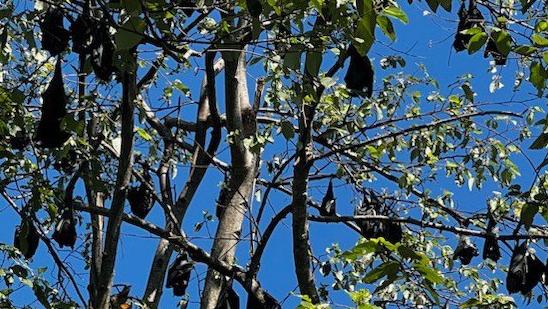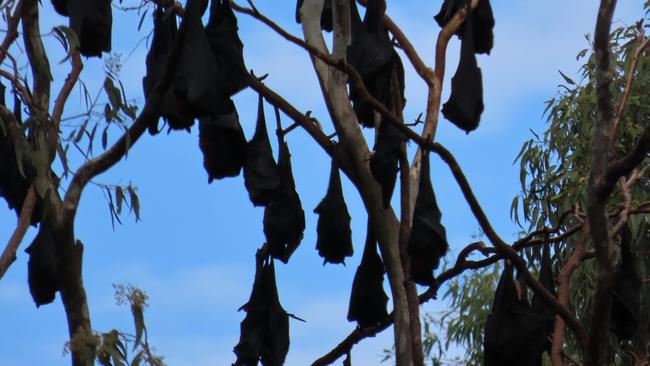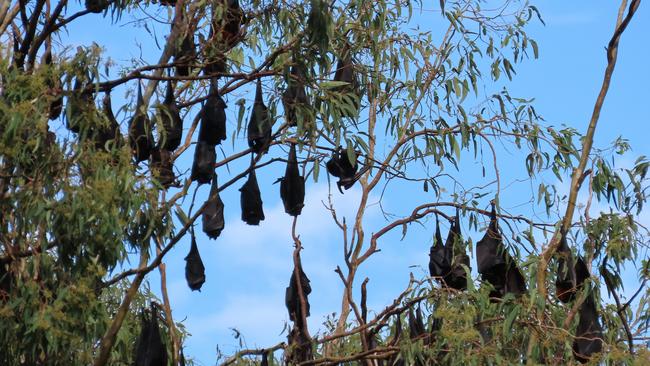Sarina residents raise the alarm about fruit bat colony
There’s a growing swell of anger over a fruit bat colony in a small Queensland town, with one councillor claiming the animals are a virus threat.
Community News
Don't miss out on the headlines from Community News. Followed categories will be added to My News.
Sarina residents are rising up in anger over the town’s bat colony, incensed by the smell, noise and what some say is a potential health hazard.
Eden Bell has lived in Sarina all his life and reckons the colony, located around Plane Creek Mill and Apex Park, is getting “ progressively worse” each year.
“Just an overwhelming amount of them,” he said.
“I have never known it to be that bad.
“There are more of them and the smell is getting worse, more pungent.
“The smell is so bad in that area, quite often, I will have the windows up, aircon off, I will even hold my breath.”
The Aurizon worker said the smell penetrated as far away as the Woolworths parking lot on Broad St.

He said the bats had degraded a walking track in the area.
“You would need a hazmat suit and a respirator to walk down there,” he said.
“It has got to affect tourism and business.”
The colony is made up of flying foxes - or fruit bats.
Mr Bell said he did not want the bats “culled”, but relocated.
This is a position shared by Mackay Councillor Martin Bella.
“I have had a gut ful,” he said.
“I drove past and it is a disgrace.
“The town reeks, it is a constant stench.
“We spent a damn fortune on that walkway, who can use it now, unless you want to get covered in bat urine and faeces.
“There are other places not that far away for those bats.”

Bats can be moved from their roost by light, noise and smoke machines.
Mr Bella said he raised his concerns over the bats two years ago, but little had been done.
“I am very upset with the lack of action on this,” he said.
He said he wrote another email to the council expressing his concerns in the lead up to the Christmas period and Mackay Regional Council CEO Scott Owen had informed him councillors would receive a briefing on the issue in the next two weeks.

Mr Bella has been bitten by a bat and said he was concerned about the potential health threat they posed.
“I was savaged by it (the bat),” he said.
CQUniversity adjunct professor Simon Robson has been studying bats for almost 40 years.
He said while it was true bats carried viruses, they only posed a minuscule health risk.
“The risk is extremely low,” he said.
“Less than one person in Australia a year (is impacted).”

Professor Robson said bats served as major pollinators for Australian trees, a crucial link in maintaining a healthy ecosystem.
“The problem is, if you get rid of them, what is going to happen to the koala, what is going to happen to basic vegetation?,” he asked.
“It really is going to have a significant impact.
“They are the major pollinator of Australia’s famous eucalyptus.
“It could have a catastrophic effect if they disappear.”
Mr Robson also cautioned against plans to relocate bats, citing a study from the University of Western Sydney that found bats were more likely to transmit viruses to other species if they were artificially moved away from their roosts.
“I understand having a bat colony next door to you is a bit smelly, but if you move it becomes somebody else’s smelly,” he said.





